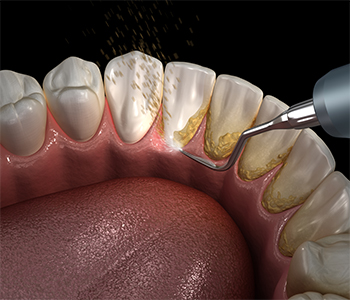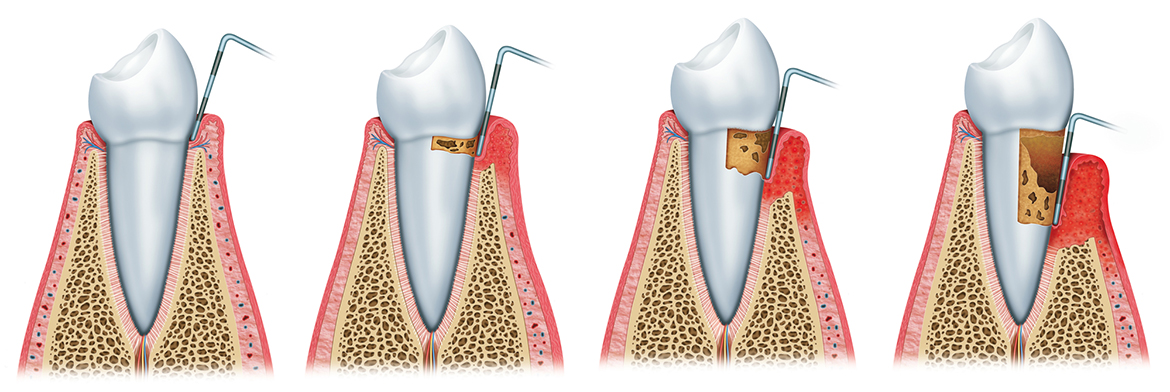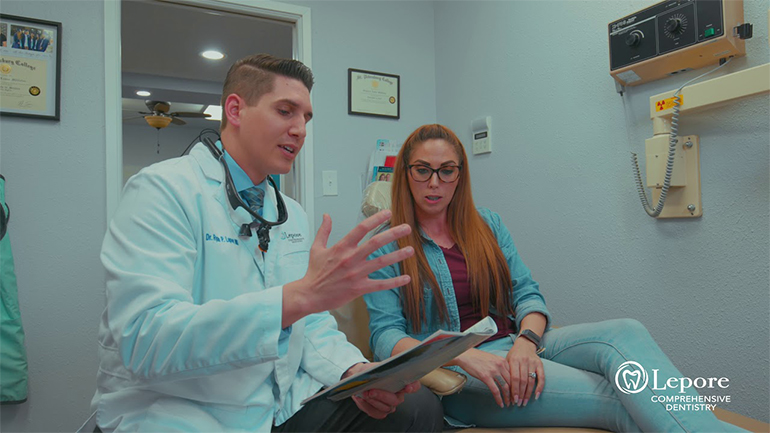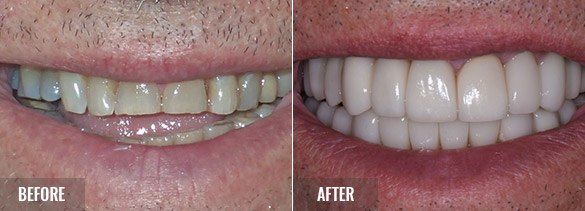What is scaling and root planing?
Removing hard deposits (calculus or tartar) from the surface of your teeth roots is known as scaling and root planing, sometimes called a “deep cleaning.” This treatment may be completed in one or multiple appointments at Lepore Comprehensive Dentistry in Dunedin, Florida, depending on your unique need.
After this therapy, you will begin to notice your gum tissue go from unhealthy (swollen and red) to healthy (firm and pink) as you continue to be seen regularly for your maintenance visits. When we see this change in your gums, we will know that the infection is under control and your gums are healthier.
For many reasons, sometimes people aren’t able to maintain the recommended frequency of dental checkups. Oftentimes, when an extended time has gone in between cleanings, a more advanced cleaning may be recommended by your doctor. Harmful bacteria and hard tartar deposits called calculus build up on your teeth above and below the gum line, releasing toxins that cause gum disease, also known as periodontitis.
Unfortunately, this build-up occurs in areas that can’t be taken care of by brushing, flossing, or even a regular dental cleaning. Over time, as periodontitis progresses, it can lead to increased inflammation, bleeding, receding gums, and ultimately receding bone tissue.
Your doctor can recommend a procedure called scaling and root planing to remove these deposits from your teeth. Scaling and root planing is a specialized procedure that removes excessive calculus and bacterial deposits beneath the gum line and is usually performed with a hand scaler and an ultrasonic cleaner, which uses high-frequency vibration to separate the calculus from the tooth. This procedure is for advanced periodontitis cases and in many cases, is so extensive that it must be done in stages. It may require multiple appointments to complete in order to ensure you are as comfortable as possible during the procedure.
By removing the deposits and bacteria, this procedure is in many cases, able to halt the spread of periodontitis. Your doctor will help you determine the next steps for continued rehabilitation of your gum tissue. However, if these symptoms are not treated appropriately, the progression can advance to a point of tooth and bone loss, requiring costly and painful reconstructive dentistry to treat.

Why do I need this type of dental cleaning?
Your toothbrush and dental floss can only clean so far below your gum line. When plaque and tartar (bacterial colonies) sit on the gums and roots of your teeth, inflammation occurs. This inflammation and the bacteria that causes it release toxins that can cause gingivitis and bleeding gums. If gum disease is left untreated, it could lead to:
- Bone loss
- Tissue (gum) loss
- Loose/mobile teeth
- Loss of teeth altogether
This type of gum disease is called periodontal disease. Dr. Lepore or Dr. Dougherty may diagnose the need for scaling and root planing (SRP) to remove the hard deposits from your teeth.
The Development of Periodontal Disease:

Can I go back to a regular cleaning after I have scaling and root planing (SRP) completed?
Periodontal (Gum) disease can be managed but not cured. After scaling and root planing have been completed, patients are typically put on periodontal maintenance or “management” of gum disease, where cleanings are performed every three to four months to maintain gum and bone health. If this interval is not followed, the very same infection that caused the need for this type of cleaning can return, causing further bone loss. Maintenance visits are the most important treatment you can complete to maintain the investment.
Periodontal Maintenance Cleaning after Scaling and Root Planing:
Periodontal maintenance therapy is an ongoing specialized program of care for patients who have been previously diagnosed and treated for periodontal disease to keep the gums and bone healthy and free of inflammation-causing bacteria.
The harmful bacteria that cause gum disease continue to build deep in the pockets between your gums and teeth even after initial treatment, often taking only three to four months to return to a damaging level. Because of this, periodontal maintenance therapy is typically done at three to four-month intervals to stay ahead of it.
During these visits, your doctor or hygienist will examine the health of your gum tissue by probing the depth of the gingival pockets and possibly also using X-rays to check the health of the supporting bone. They will then perform a deep cleaning of the teeth beneath the gum line and deep into the pockets, removing any plaque and bacteria buildup that has occurred since the last visit. Any uneven surface areas of the teeth will be smoothed out to discourage additional bacteria from attaching.
Given that there is no cure for periodontal disease, periodontal maintenance therapy is crucial to prevent it from worsening and causing additional complications for your oral and systemic health. Your doctor will work with you to create a maintenance schedule that best suits your unique needs.
Conditions that can lead to the development of periodontal disease include:
- Poor dental hygiene and irregular cleaning appointments
- Smoking
- Hormonal changes
- Family history
- Poor nutrition
What else can I do to manage my gum disease?
- Before starting your periodontal therapy (scaling and root planing), Dr. Lepore or Dr. Dougherty will recommend salivary diagnostic testing to identify specific levels of 11 harmful bacteria known to contribute to periodontal disease. Recent studies have shown these very bacteria to cause or lead to conditions such as heart attack, stroke, and Alzheimer’s disease. Learn more about salivary diagnostics testing here.
- Every patient can also benefit from PerioProtect Trays. These trays release oxygen medication into the pockets of your gum tissue to manage and kill the harmful bacteria harbored there. Learn more about the benefits of PerioProtect here.
- To further benefit you and prevent future issues, Oral Probiotics may be recommended. These work very similarly to gut probiotics, driving out the harmful bacteria to replace them with good bacteria. Learn more about the benefits of Oral Probiotics here.
- At your four-to-six-week evaluation with your dental hygienist, she will re-measure your gum tissues (or pocket depths) for improvements and offer over-the-counter or at-home remedies to assist you in achieving your best health.
Lepore Comprehensive Dentistry – It’s Not Just About Dental Treatments!

I originally met Dr. Lepore through a referral with an employee I used to work with. She raved about Dr. Lepore and the staff so I was super comfortable so Dr. Lepore came to me and he explained to me, ‘hey this is what is going on you do have periodontal gum disease and then he taught me the ways to control it. Knowing the fact that they wanted to get close and get to know me as a patient made me super comfortable with coming to Dr. Lepore. I have also referred a few people to Dr. Lepore, read numerous Facebook messages saying that they are so compassionate here. they love their patients they get to know their patients on a personal level so overall Dr. Lepore and his staff are an amazing group of people, very loving, very compassionate and very personable and I mean that is what I really, really enjoy about this place.
Request an Appointment








